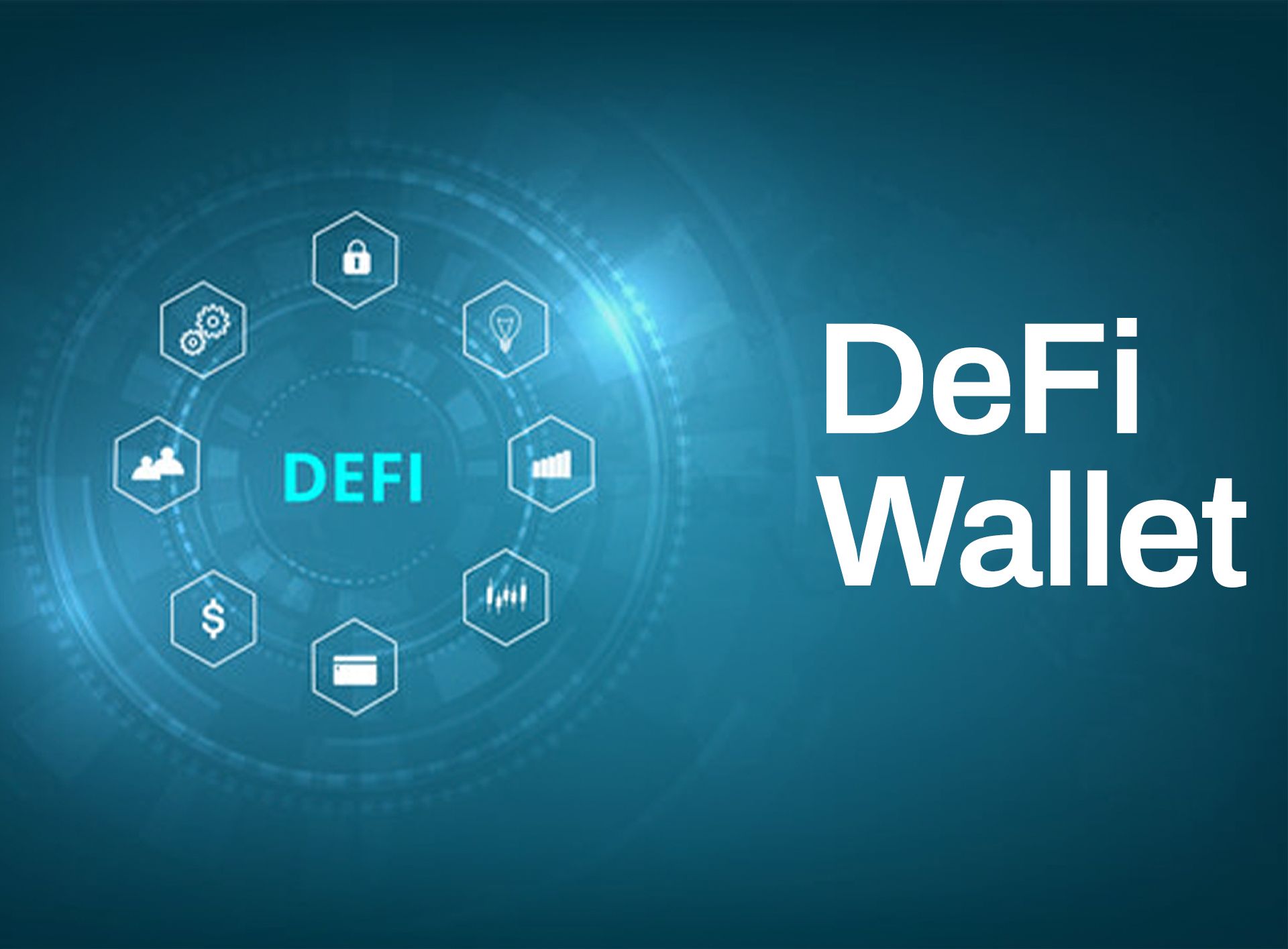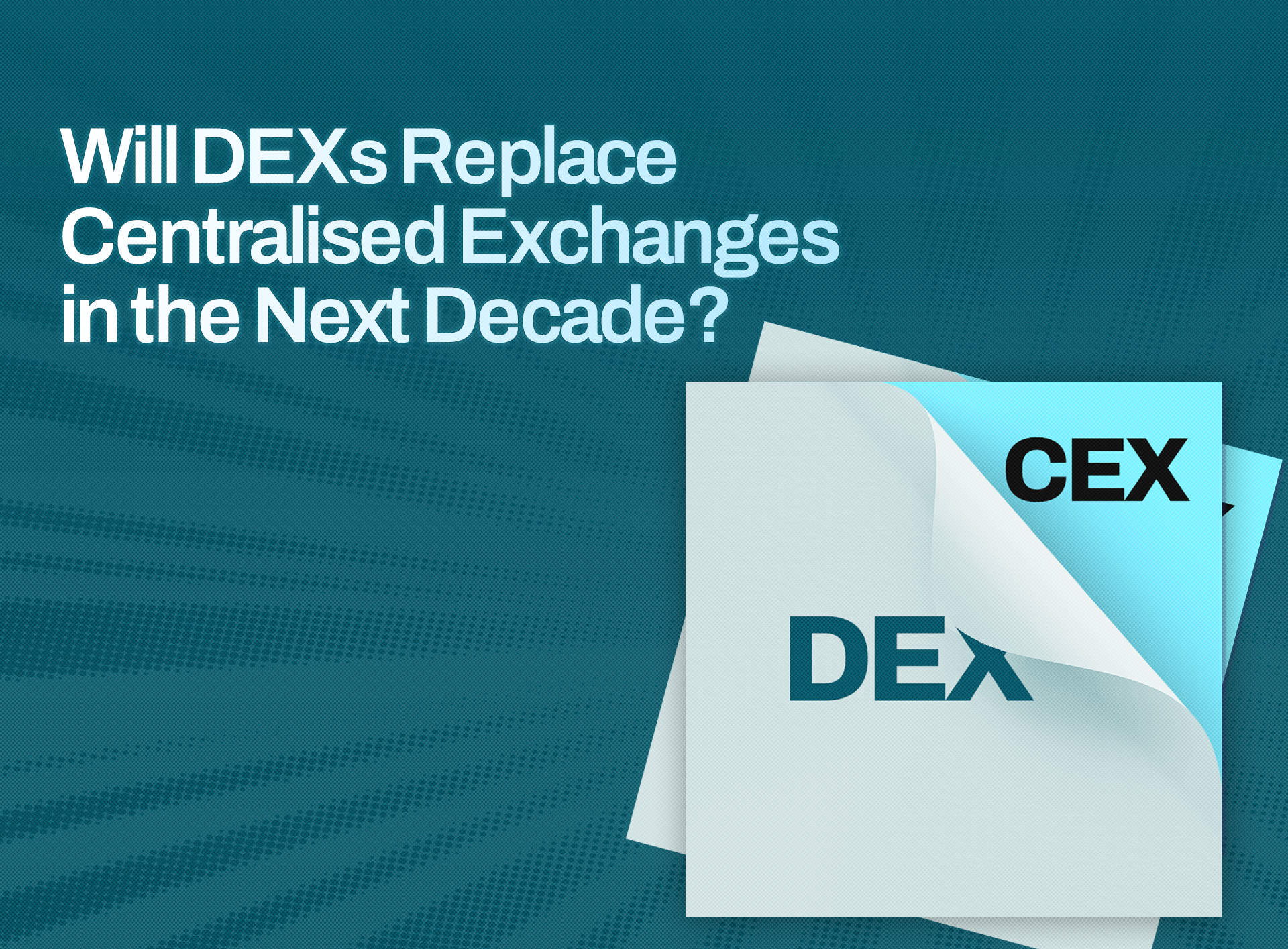Table of Contents:
- What is DeFi in Crypto?
- What is a DeFi Wallet?
- How Does a DeFi Wallet Work?
- Key Features of a DeFi Wallet
- Benefits of Using a DeFi Wallet
- How to Choose a DeFi Wallet for Your Crypto Needs
- Common Types of DeFi Wallets
- Examples of Popular DeFi Wallets
- How to Set Up a DeFi Wallet
- To Recap
- FAQs
Decentralised Finance, or DeFi, is changing how people interact with cryptocurrencies.
Before now, the best practices for money management were through traditional banks, savings accounts, and physical wallets.
However, with the rise of crypto, DeFi wallets have become essential tools for accessing and managing digital assets securely.
In this article, we'll explain what a DeFi wallet is, how it works, and why it’s vital for anyone involved in crypto.
What is DeFi in Crypto?
DeFi, short for "decentralised finance," is a technology that allows people to access financial services directly on the blockchain without needing a central authority like a bank or government.
In the traditional financial system, banks control money and financial transactions. With DeFi, however, users can lend, borrow, trade, and earn interest on their crypto assets without relying on intermediaries.
DeFi operates through smart contracts—self-executing programs on the blockchain that automatically enforce the terms of an agreement.
One appeal of Defi is its openness and accessibility. Anyone with an internet connection and a crypto wallet can access it, creating a global availability of financial services without barriers like credit checks or high fees.
For example, platforms like Aave and Compound allow users to lend their crypto assets and earn interest or borrow assets by providing collateral.
Defi protocols are powered by various blockchain networks, primarily Ethereum, which is home to many DeFi applications.
What is a Defi Wallet?
A DeFi wallet is a digital tool designed specifically for decentralised finance (DeFi) activities that allows users to store, send, and receive cryptocurrencies without relying on any bank or financial institution.
Unlike traditional wallets, a DeFi wallet gives you complete control over your crypto assets. You're the sole owner of your private keys (the code that gives you access to your funds), unlike in centralised wallets, where a company or platform holds your keys.
For example, if you use a crypto DeFi wallet like MetaMask or Trust Wallet, you're in full control of your crypto holdings, whether it’s Bitcoin, Ethereum, or other tokens.
These wallets are often available as a crypto wallet app on mobile devices or as browser extensions. They also allow users to interact directly with decentralised applications (dApps) such as DeFi platforms like Uniswap or Aave.
How Does a DeFi Wallet Work?
1. Create Your Wallet:
The first step to using a crypto DeFi wallet is creating one. Most decentralised wallets can be set up by downloading a crypto wallet app. Once downloaded, the app will guide you through creating your new wallet by generating a unique set of private keys. You’ll also receive a "seed phrase," which is a backup phrase used to recover your wallet if you lose access.
2. Store and Manage Crypto:
Once your DeFi wallet is set up, you can start storing different cryptocurrencies. These wallets support a variety of digital assets, not just Bitcoin or Ethereum. You can receive crypto by sharing your wallet address, which allows others to send you tokens directly. You can also transfer your assets between wallets or send them to other users using the same method.
3. Access Decentralised Applications (dApps):
One of the main features of a crypto DeFi wallet is its ability to interact with decentralised applications or dApps. These are platforms built on blockchain networks where you can lend, borrow, trade, and earn interest on your cryptocurrencies.
4. Swap Tokens:
Most DeFi wallets also have a built-in token swap feature, allowing you to exchange one cryptocurrency for another through smart contracts without needing a central exchange.
5. Security:
Since Defi wallets are non-custodial, the security of your funds largely depends on how well you safeguard your private keys and seed phrase. Unlike centralised wallets, no one can help you recover your assets if you lose your private keys, so it’s important to store them safely, ideally offline.
Key Features of a DeFi Wallet
1. Non-Custodial Control:
One of the most important features of a DeFi wallet is that it's non-custodial. This means you, the user, have complete control over your assets. Unlike traditional wallets or exchange wallets, no third party holds your private keys. This eliminates the risk of your funds being frozen or lost by a company.
2. Multi-Asset Support:
A good crypto wallet app should support a variety of cryptocurrencies, not just Bitcoin or Ethereum. The ability to hold multiple tokens and coins is useful for people with diverse investment portfolios. For instance, wallets like MetaMask or Trust Wallet support thousands of tokens across different blockchains, making them highly versatile for users.
3. Integration with DeFi Protocols:
A crypto DeFi wallet should also allow easy access to DeFi platforms for lending, borrowing, staking, and trading directly from the wallet. For example, apps like MetaMask and Argent let users interact with platforms like Uniswap or Aave without leaving the wallet interface.
4. Security Features:
Look for features like two-factor authentication (2FA), encryption, and biometric login. Some wallets also offer a recovery phrase, usually 12 or 24 words, which allows you to regain access if your wallet is lost or stolen.
5. User-Friendly Interface:
Even though the concept of DeFi can be complex, a decentralised crypto wallet should be easy to use, even for beginners. Some wallets have intuitive designs that make it easy for users to send and receive assets, monitor balances, and interact with DeFi protocols without confusion.
6. Cross-Platform Compatibility:
A reliable crypto wallet app should be available on both mobile and desktop, ensuring users can access their funds wherever they are.
Benefits of Using a DeFi Wallet
1. Full Control Over Your Funds:
Unlike centralised wallets, a decentralised crypto wallet allows only you to access your private keys. You can send, receive, and manage your assets without needing approval from any intermediary. This level of control offers more freedom and independence, but it also means that you must take care of your private keys to avoid losing access.
2. Enhanced Privacy:
DeFi wallets also provide a higher level of privacy. Since you are not required to submit personal information when creating a crypto DeFi wallet, you can maintain anonymity. Traditional financial systems often require extensive identity verification, but with a decentralised crypto wallet, transactions are carried out without linking them directly to your identity.
3. Access to DeFi Services:
With a DeFi wallet, you can easily access a range of decentralised finance services like lending, staking, and swapping tokens. The ability to connect directly to DeFi services allows you to earn interest on your crypto or participate in liquidity pools.
4. Lower Fees:
Centralised exchanges or banks often charge significant fees for transactions or services. With a decentralised crypto wallet, you typically pay only the network gas fees, which can be much cheaper, especially for large transactions. For example, Ethereum gas fees vary depending on network congestion, but you can often save money by choosing a time when fees are lower.
5. Global Accessibility:
A DeFi wallet gives you access to your funds and services from anywhere in the world, as long as you have an internet connection. Traditional banking systems are often restricted by location or require you to go through specific processes to send money internationally. With a crypto DeFi wallet, you can send crypto to anyone, anywhere, at any time, without restrictions.
How to Choose a DeFi Wallet for Your Crypto Needs
1. Understand the Types of DeFi Wallets:
First, it’s essential to know the different types of DeFi wallets available. There are two main categories: hot wallets and cold wallets. Hot wallets are connected to the internet, making them more convenient for regular transactions but less secure. Cold wallets, on the other hand, are offline, providing higher security for long-term storage of cryptocurrencies.
2. Consider Security Features:
Look for wallets that offer features like two-factor authentication (2FA), multi-signature support, and encryption.
3. Check Compatibility with Assets:
Make sure the DeFi wallet you choose supports the cryptocurrencies you want to hold. Some wallets may only work with specific tokens or blockchains. Research the compatibility of your chosen wallet to avoid any issues later on.
4. Evaluate User Experience:
Look for wallets with clear instructions and easy navigation. Many DeFi wallets offer mobile versions, such as a crypto wallet app, which allows you to carry out transactions on the go. Read user reviews to evaluate the overall experience before making your choice.
5. Review Transaction Fees:
Different wallets have different fee structures. Some might charge transaction fees for sending or receiving funds, while others may have hidden fees. Always review these costs, as they can add up over time, especially if you frequently trade or transfer assets.
6. Research Community Feedback:
Before selecting a DeFi wallet, look into community feedback and ratings. Platforms like Reddit or crypto forums can provide insights from real users. A wallet with a strong reputation and positive reviews is likely to be more reliable and trustworthy.
7. Test with Small Transactions:
Once you’ve selected a DeFi wallet, consider testing it with a small transaction before committing a larger amount of crypto. This step helps you understand how the wallet functions and ensures it meets your needs without risking a significant amount of your funds.
Common Types of DeFi Wallets
1. Hot Wallets:
Hot wallets are online wallets connected to the internet. They are easy to access and are often provided by crypto wallet apps.
This type of wallet is user-friendly and suitable for beginners because it allows for quick transactions.
However, they are less secure than cold wallets since they are vulnerable to hacks.
2. Cold Wallets:
Cold wallets are offline storage solutions that provide higher security for your assets. They store your private keys on a device not connected to the internet, making them less vulnerable to cyber-attacks.
Hardware wallets like Ledger and Trezor are examples of cold wallets.
While cold wallets are excellent for long-term storage of cryptocurrencies, they can be less convenient for frequent transactions.
This type of wallet is ideal for individuals holding a significant amount of digital currency in their crypto DeFi portfolios.
3. Web Wallets:
Web wallets are accessed through a web browser and typically come from DeFi platforms or exchanges.
They offer ease of use and can be quickly set up without downloading software.
However, users need to trust the provider with their private keys, which can be risky.
These are suitable for users who trade frequently but may not offer the best security for long-term asset storage.
4. Mobile Wallets:
Mobile wallets are decentralised crypto wallets that store credit or debit card information on your mobile devices.
They allow users to manage their crypto DeFi assets on the go, providing a balance between convenience and security.
Many mobile wallets, like Trust Wallet or Coinbase Wallet, feature user-friendly interfaces and integration with various DeFi applications.
While they are great for everyday transactions, users should ensure they have security measures in place, such as two-factor authentication.
5. Desktop Wallets:
Desktop wallets are installed on personal computers, and private keys are stored and managed on computer hard drives.
They are more secure than hot wallets because they store private keys locally, but they still carry some risks if the computer is compromised.
Examples of this type of wallet are Exodus and Atomic Wallet.
Examples of Popular DeFi Wallets
1. MetaMask:
MetaMask is one of the most widely used decentralised crypto wallets. It allows users to store and manage Ethereum and ERC-20 tokens.
With over 30 million monthly active users, MetaMask makes it easy to connect to various dApps directly from your browser.
It also offers mobile versions for Android and iOS.
2. Trust Wallet:
Trust Wallet is Binance's official wallet and supports a wide range of cryptocurrencies, making it an excellent option for those interested in crypto DeFi.
It allows users to buy, store, and swap cryptocurrencies within the app. It has over 10 million downloads.
3. Coinbase Wallet:
Separate from the Coinbase exchange, the Coinbase Wallet is a crypto wallet app that gives users complete control over their private keys.
It supports various cryptocurrencies and allows users to access DeFi wallets and apps seamlessly.
4. Argent:
Argent is a mobile-first DeFi wallet designed with security and ease of use in mind.
It supports Ethereum-based tokens and integrates with various DeFi platforms for lending, borrowing, and trading.
Argent stands out because it eliminates the need for seed phrases and offers recovery options that simplify user experience.
5. Gnosis Safe:
For those who require multi-signature capabilities, Gnosis Safe is an excellent choice.
This decentralised crypto wallet allows multiple users to manage funds, making it suitable for teams and organisations.
Gnosis Safe is known for its robust security features and is widely used in the DeFi community for managing large amounts of cryptocurrency.
How to Set Up a DeFi Wallet
1. Choose a Crypto Wallet App:
The first step is to choose a crypto wallet app. As has been stated, there are many options available.
2. Download and Install the App:
Once you have chosen your wallet app, download and install it from the official website or app store. Make sure to avoid unofficial sources to reduce the risk of downloading malware. After installation, open the app to begin the setup process.
3. Create a New Wallet:
Upon opening the app, you will have the option to create a new wallet. Follow the on-screen instructions, which typically involve creating a strong password and writing down a recovery phrase. This recovery phrase is crucial, as it allows you to recover your wallet if you lose access. Store it in a safe place and never share it with anyone.
4. Fund Your Wallet:
Next, you need to fund your DeFi wallet. You can do this by purchasing cryptocurrency from an exchange like Obiex and then transferring it to your wallet address.
For example, if you want to use Ethereum for your DeFi transactions, buy it on an exchange and send it to your wallet.
Make sure to double-check your wallet address, as sending crypto to the wrong address can lead to permanent loss of funds.
5. Connect to DeFi Platforms:
After funding your wallet, you can connect it to various DeFi platforms. These platforms allow you to lend, borrow, or trade cryptocurrencies.
To connect your wallet, visit the DeFi platform’s website, click on the "Connect Wallet" button, and follow the prompts to link your wallet.
This connection allows you to use the features of the platform, such as providing liquidity or earning interest on your assets.
6. Manage Your Assets:
Finally, regularly check and manage your assets within the DeFi wallet.
Many wallets provide a dashboard where you can view your holdings and track your investments.
To Recap
- DeFi, or decentralised finance, is a technology that allows people to independently access financial services directly on the blockchain.
- A DeFi wallet is a decentralised tool that is specifically designed to help users store, send, and receive cryptocurrencies.
- Most decentralised apps are available as crypto wallet apps. So they can be downloaded and set up.
- DeFi wallets can interact with other decentralised applications.
- With DeFi wallets, you have sole control over all your assets.
- When choosing a DeFi wallet, consider security features, compatibility with other dApps, transaction fees, and user experience.
- Regularly check and manage the assets in your wallet.
FAQs
Q1. What is DeFi in crypto?
DeFi refers to decentralised financial services that operate on blockchain technology, without intermediaries like banks.
Q2. What is a DeFi wallet?
A DeFi wallet is a tool for storing, sending, and receiving cryptocurrencies while giving users full control over their private keys.
Q3. How does a DeFi wallet work?
A DeFi wallet generates a public and private key for users to manage their crypto. It stores the private key locally, ensuring full user control.
Q4. What is the difference between a DeFi wallet and a centralised wallet?
A centralised wallet is managed by a third party (such as an exchange), while a DeFi wallet gives you complete control over your assets and private keys.
Q5. Are DeFi wallets safe?
Yes, DeFi wallets are secure as long as users keep their private keys and recovery phrases safe.
Q6. Can I store multiple cryptocurrencies in a DeFi wallet?
Yes, most DeFi wallets support multiple cryptocurrencies across different blockchains.
Q7. How do I choose a DeFi wallet?
Consider factors like security, ease of use, asset support, and compatibility with DeFi applications when choosing a DeFi wallet.
Q8. What happens if I lose my private key?
If you lose your private key, you can recover your wallet using the recovery phrase provided when you set up the wallet.
Q9. Is there a fee to use a DeFi wallet?
DeFi wallets themselves don’t charge fees, but you will incur network transaction fees when sending or receiving crypto.
Q10. What is crypto DeFi wallet, and how does it differ from a regular crypto wallet?
A crypto DeFi wallet provides decentralised access to DeFi applications, giving users full control over their funds, unlike regular wallets managed by central authorities.
Disclaimer: This article was written to provide guidance and understanding. It is not an exhaustive article and should not be taken as financial advice. Obiex will not be held liable for your investment decisions.




